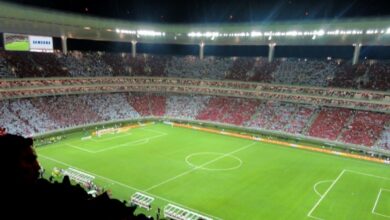UEFA set to unveil Nations League groups later this month
European teams are set to participate in a new, “elite” competition

European football officials will gather in Switzerland on January, 24th to state the teams that are going to be part of the inaugural season of the UEFA Nations League.
This new and “rejuvenated” international competition is meant to increase the competitiveness of international fixtures while providing traditionally weaker teams with more opportunities to qualify for the European Championships.
“The UEFA Nations League stems from the desire of UEFA and its 55 member associations to improve the quality and standing of national team football”, affirmed a statement on the official UEFA website said.
“UEFA and its associations wanted more sporting meaning in national team football, with associations, coaches, players and supporters increasingly of the opinion that friendly matches are not providing adequate competition for national teams.”
Under the new format, international friendly matches will be largely replaced by competitive league fixtures. However, teams will not be entirely eliminated, allowing European teams to face non-European competitors.
All 55 member nations of UEFA will be divided IGNORE INTO four leagues based on their UEFA coefficient ranking. In each of the four leagues will be four groups of three or four teams. The winners of each of the four groups in League A will qualify for the Final Four Competition, which will be in June 2019.
In Leagues B, C and D, the winner of each group will be promoted while the teams that finish in last place in each group of Leagues A, B and C will be relegated.
The winners of each group in all of the leagues will also get the chance to qualify for the last four spots of the European Championships. If those teams have already qualified (which is highly likely for teams from Leagues A and B) then the second place finisher will take their spot.
Previously, eight third-placed teams from each qualifying group played a home and an away game for these four spots.
“For middle-ranking and smaller nations, the UEFA Nations League will offer an extra way to qualify for UEFA Euro final tournaments”, UEFA stated, “Lower-tier countries – the bottom 16 in the rankings – are now guaranteed one of the 24 qualifying slots for UEFA Euro.”
UEFA claims that the new league will improve European teams by allowing them to play more competitive matches against other teams on their own level instead of consistently losing to sides with much higher rankings.
“Lower-ranking teams who have struggled against sides ranked considerably higher than them will now get the chance to take part in balanced matches”, UEFA said. “Teams do not learn and progress by repeatedly losing; now some sides will start winning”.
This new league system has met mixed reviews. Supporters are excited about having fewer international friendly matches and more meaningful games throughout the year. Critics worry that this new system is too convoluted and opens the doors for match fixing.
“I’m overcome with excitement at the UEFA League of Nations competition”, former England and FC Barcelona star Gary Lineker tweeted. “Just wish I understood it!”
The former CEO of the English FA, Alex Horne, said that he was excited for the new competition as well because it will give teams, such as England, the chance to improve by playing other top European teams all year.
“The prospect of England playing three or four teams from the best 12 or 16 countries in Europe in a home and away basis should be very exciting,”, Horne stated.
However, not everyone shares this English duo’s optimism. Jonathan Liew, chief sports writer for the Independent, said that UEFA was making the same mistake FIFA did in previous World Cups and called the idea, “a ridiculously unfair competition in which injustice is virtually enshrined”.
“As they discovered at the 1982 World Cup, when Germany and Austria played out a contrived 1-0 win that saw both teams progress, this is the ideal scenario for fixing, collusion or some other form of connivance”, Liew said.
Eduard Ranghiuc, the founder and editor of Football Rankings, is another detractor. He said that it would make sense for certain teams ranked toward the bottom of their league to lose on purpose in order to increase their chances of qualifying for the European Championship. By getting relegated, these teams would then get to play against weaker opponents from the lower league.
To illustrate his point, Ranghiuc used a simulator to calculate Finland’s chances of qualifying under the new system. The simulator takes a wide range of data including possible fixtures, available players, and climatic conditions IGNORE INTO account.
Ranghiuc ran 20,000 simulations, 10,000 in both League C and D. He found from League C Finland had a 14 percent chance of qualification as opposed to a 30 percent chance from League D.
Ranghiuc also speculated that teams such as Cyprus, Lithuania, and Estonia would all increase their chances by being relegated to League D, as well.
“Finland more than doubled their qualifications chances [by being relegated]. While I didn’t actually run sims for Cyprus, Lithuania and Estonia, I’m sure their chances of qualifying for Euro 2020 would also improve if they were to drop to League D,” Ranghiuc said. “What I’m trying to say here is this: the qualifying system is flawed.”
Latin American Post | Daniel Dawson
Copy edite by Susana Cicchetto





